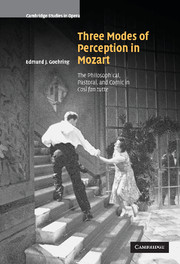Book contents
- Frontmatter
- Contents
- List of tables
- Preface and acknowledgments
- A note on translations
- List of abbreviations
- Chapter 1 An overture to Così fan tutte: the poetics of the opera over two centuries
- Chapter 2 The philosophical mode
- Chapter 3 The pastoral mode
- Chapter 4 The comic mode
- Epilogue
- Bibliography
- Index
Chapter 1 - An overture to Così fan tutte: the poetics of the opera over two centuries
Published online by Cambridge University Press: 22 September 2009
- Frontmatter
- Contents
- List of tables
- Preface and acknowledgments
- A note on translations
- List of abbreviations
- Chapter 1 An overture to Così fan tutte: the poetics of the opera over two centuries
- Chapter 2 The philosophical mode
- Chapter 3 The pastoral mode
- Chapter 4 The comic mode
- Epilogue
- Bibliography
- Index
Summary
During the two centuries following its premiere, the news about Così fan tutte has generally not been good. Most of the nineteenth century and a good part of the twentieth condemned it, altered it beyond recognition, or, more frequently, simply ignored it. Today, the opera enjoys a more secure place in the repertory, yet opinion about and approaches to the work have shown remarkable stability over this span. In tracing a path back through the critical history of the opera, one spots a single perception above all others: that the opera's text seems to be incompatible with its music. This introduction will explore and assess this central issue in Così fan tutte's reception with two particular historical/critical objectives in mind. First, it will show how present-day thinking about the opera comes out of critical approaches formulated in the nineteenth century. Then, it will offer a different way of conceiving the opera's handling of word and tone, one that finds agreement rather than incongruity between the two.
A HISTORY OF WORD/MUSIC RELATIONS IN COSÌ FAN TUTTE
Nineteenth-century roots to modern thought
Although isolated complaints dot the beginnings of Così fan tutte's reception, a more consistent animus toward the opera spread with the life-and-works studies that appeared from the close of the eighteenth century. Niemetschek's Leben of 1798 inaugurates the tradition with this oft-cited comment: “One wonders how [Mozart] could have condescended to squander his divine melodies on such a frivolous hodgepodge of a text.
- Type
- Chapter
- Information
- Three Modes of Perception in MozartThe Philosophical, Pastoral, and Comic in Cosí fan tutte, pp. 1 - 52Publisher: Cambridge University PressPrint publication year: 2004



